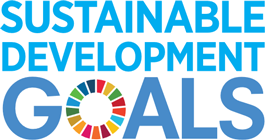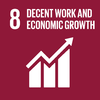Decent Work and Economic Growth
Session 2
Jun 13 '18 6:50pm–Jun 13 '18, 8:35pm GMT
Summary of Discussion
Q7: Equal access to work + preparation for change
- Equal access globally to technology and online learning
- Focus on collaborative learning more than just acquisition of knowledge
- Including women, migrant workers, people with disabilities, most vulnerable in policies and practices
- early-investment incubators and accelerators for marginalized communities
- Future of cities (access/alternatives to education, transportation, tech, work space/location)
- Investing in building life skills, focus on problem-solving skills
- Strengthening of worker's rights, inclusion of labor provisions in trade agreements
- Exercise our agency and buy products and services of organizations that are more socially responsible
Q6. Vocational skills
- Vocational skills key to success as many emerging areas of opportunity will require technical skills/certifications
- Soft skill deveopment equally important
- Stimulation of STEM interest at a young age
- With the circular economy, vocational training and up-skilling take on a new look. Many brands are reinventing their sourcing supplies and business practices, thereby calling for new applied learning.
- Interest in Purpose-driven work is on the rise (aligned to values) and growth of gig economy
- Need investment from govt for apprenticeship schemes
Q5. Policies/investments required
- Business examples shared: AT&T efforts to reskill workers through online training, intra-preneruship training models, Evian retraining (and keeping) workers after introduction of automation
- Business investments in education need to be long-term, coordinated, directed not just to children/youth but also older workers and more marginalized
- Look to cross-cutting sectors that can overcome gaps in several areas (e.g., health workforce)
- Advocacy for investment in career/technical education
- Lifelong learning accounts
Q4. Role of NGOs, Gov't, Biz in skills gap solutions
- Collaboration between biz, gov't, non-profits, educators to ID opportunities - use of data to understand what skills are in demand, what skills are available, what jobs are available - focusing on both high-skilled jobs and low skill/low pay jobs as well
- More focused vocational training and apprenticeships (as in Germany)
- Green jobs
- In collaborations: Academics can provide the data and analysis, adapting curriculum, technical and soft skill development framework. NGOs can provide perspective, weighing trade-offs and options, striving to not settle for “good enough”. Corporations can provide funding, technical and business expertise, global experience, technology, apprenticeships, training. Governments can provide infrastructure support, policies, standards.
Q3: Skills gap - how to help workers thrive
- Inudstry collaboration and intersectoral partnership to address underlying issues (dislocation of people)
- Busines to work with gov't and educational institutions on what skillsets/training are needed AND help supply the latest in-demand technology/processes/tool to educators AND help shape new curricula
- Use of exponential technologies in education - a focus on applying knowledge, not just gaining it
- Development of skills related to mass data production and analysis
- Skills needed in age of globalization/digitization (e.g., cross-cultural competencies, languages, IT skills, interpersonal skills, etc.)
- Experiential learning and mentorship in K-16 schools (apprenticeships, learning circles)
- New framework for education schools, reflecting ways to teach different sets of skills
- A focus on life skills training to minimize attrition once on the career path
Q2. Business change + implications for employers/employees
TECH: AI, biotech, automation, internet of things, robotics, automated transportation AND
transition to design thinking and systemic innovation for circular economy > reshaping how work is done - need to stay up to date (both businesses and employees)
- Change in the way we leverage social, natural, economic capital for good
- how to responsibly integrate new tech
- Policies driving equality and inclusion in hiring/promotion
- greater collaboration between industry/govt/educational orgs to prepare future workforce
- Investing in lifelong learning and reskilling
- Increased inequality due to gap in upskilling people
- Gig economy unregulated = exploitation
- Social costs of job migration from one country to other
- Transformation of jobs to align with new demands will be key
Q1. Factors inhibiting decent work / growth
- Education access and equity / low educational achievement
- Cyclical (not situational) poverty / Low socio-economic status = not being able to afford/support education
- Lack of entrepreneurship/skill development
- Health challenges (esp. developing countries)
- Lack of knowledge transfer
- Lack of cradle-to-career education investment (K-16 education, lifelong learning/upskilling, etc)
- Upskilling for workforce re-entry
- Updating curricula to keep students relevant upon graduation / retooling skillls for the new economy
- Keeping people abreast of new kinds of job opportunities
- Erosion of collective worker voice / corporate short-termism
- Fissuring of the workplace and rise of independent work, franchising (diminished relation between workers/employers)
- Barriers to access to technology and ability to participate globally
- Lack of upholding of ILO fundamental principles and rights of work (e.g., ending forced/child labour, right to collective bargaining, freedom of assoc., non-discrimination)
- Low/misaligned expectations among youth
- Gender inequality
- Isolation/limited Zones of Proximal Development
- The youth bulge
Meet our Special Guests
Maureen Tholen
Sustainability Director
3M
3M
Anita Househam
Senior Manager, Supply Chai…
United Nations Global Compa…
United Nations Global Compa…
Joshua Lachs
Chief Development & Cli…
Net Impact
Net Impact
Timothy Lawrence
Executive Director
SkillsUSA
SkillsUSA
Libby Reder
Fellow, The Future of Work …
The Aspen Institute
The Aspen Institute
Dora Sari
Research Fellow, Labor and …
Harvard University
Harvard University
Armando Justo
Performance Management and …
George Washington Universit…
George Washington Universit…
Luis Torres
VP, Global Talent Management
Millicom International
Millicom International
Maxime Verstraete
Vice President, Corporate R…
Hilton
Hilton
Session Moderator
Eric Whan
Director, GlobeScan
Canada
Canada
Most-liked
Armando Justo
1
See you all in the next discussion! Armando Justo
1
I see that in the near future a big NGO will be congregatin… Rohan Chindooroy
2
Thank you all, that was enlightening. Looking forward to mo… 



Posts
Back to Top